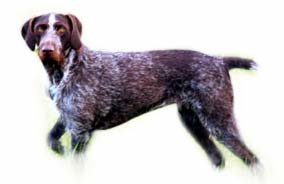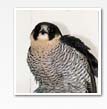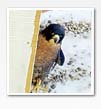 Falconry
Dogs Falconry
Dogs
Parkland Mews has been very intentional about finding
an all-purpose field dog for falconry. This search has led us to
a wonderful versatile breed, the Deutsch Drahthaar (not to be confused
with the German Wire-Haired Pointer).
The breed provides an outstanding
pedigree of over 100 years of continuous testing and is highly suited
as a Falconer's dog. The proven adage of a good bird dog makes an
excellent game hawk can easily be applied to the Deutsch Drahthaar.
Parkland Mews is proud to announce
the establishment of Vom Prairie Point Kennels,
having satisfied the strict breeding and performance criteria required
by the Deutsch Drahthaar Club of Germany.
We were not successful in having a litter
in the spring of 2004, however, we are expecting a new female puppy
in the fall of 2004. Check back for news on new litters in the future.
Dog Mentality
Affability
For those with a versatile breed used for hunting, affability is
probably the first thing observed as a primary indicator before
deciding to proceed on this aspect of the field companion of our
choosing. There are degrees of affability from ‘in your face’
friendliness to the aggressive ‘do not come any closer I do
not trust you’. Most field dogs are chosen because they range
from being excessively affable to affable to less affable. Particularly
in the context of training and in regards to social interaction
with other human beings.
Prey Drive
The will to find and follow/chase prey. It is the force that propels
the dog until the prey is dead. Wild canines may have a moderate
prey drive as conservation of energy is paramount in order to survive.
Methodical tracking over several days until opportunity allows for
maximum efficiency of energy expenditure resulting in a successful
kill and replenishment of life giving sustenance. A good falconry
dog can have a strong consciousness of prey as they are required
to produce game for the falcon and falconer. Regardless of the outcome
the dog is taken home in the evening and fed.
In the wolf pack the alpha dogs and bitches control
the pack. Once hunting begins the hierarchical feature is not evident
until the time of the kill, then it becomes apparent once more.
This can be used to explain why in some dogs where prey drive is
strong rather than moderate there is no recognition of the hunter
during the hunt. These dogs can be harder to control. On the other
hand they do not need the same requirement of reward, for them the
hunt is motivation enough, and often put in a good days work without
becoming disinterested.
Competition Drive
A complex characteristic that can be divided into two parts. Competition
during hunting and social competition. Needless to say a dog that
has both strong prey and competition drive is of no real practical
use in the field where manners and codes of conduct are the norm.
Competition drive can manifest itself by a pronounced desire to
search for a retrieve that forces a dog through brambles and down
holes. That is the positive aspect, the negative aspect is the amount
of control required to direct the retrieving work, as this aspect
is stimulating to the dog. There is also a tendency for dogs with
strong competition drive to chew the game and to keep it from the
handler once the game has been retrieved. The social competition
is seen in the desire to play with, fight, attack and dominate other
dogs. Finally a wolf requires moderate amounts of both prey and
competition drive, a field dog may only require one because of the
role of falconer and falcon/gun.
Liveliness
Liveliness is an important quality of the field dog. It is the efficiency
which it deals with change in command or mode or conditions. For
example a ‘very lively dog’ may have an instantaneous
reaction to the fetch command and retrieve at high speed. Very good
for situations where lots of action is expected. Continental breeds
which often have moderate liveliness can be more effective in poor
scenting conditions as they have the ability to analyze faint scent
on the ground or in the air. The lively British setters may to better
in strong scent conditions as this can propel the dog to search
further.
Sharpness
Sharpness is the tendency to act with aggression. It is expected
in field dogs in moderate levels and can be an advantage when dealing
with unwanted predators.
Defense Drive
This drive in moderate levels can be seen in the desire to protect
the hunters game and equipment. The defense is directed to protect
the dog, the pack and its belongings.
Nerve Stability
Nerve stability describes the degree or otherwise of nervousness
displayed by the dog. The ideal being calm and not nervous at all.
This is an ideal as most dogs have a degree of nervousness. In the
case of field dogs it is used to determine the ability of the dog
to judge correctly change in circumstance and how it reacts. This
is a complex component as it is often intertwined with sensitivity
to stress. For example a dog with strong prey drive but sensitive
to stress can actually stop using its nose as a result of degree
of nerve stability. Other dogs can be so nervous song birds distract
them or they shake continuously.
Hardness
Hardness ranges from very hard to very soft. It is the sensitivity
to either positive or negative influence. Hard dogs can take continuous
punishment from fighting for prey contact. They never win obedience
competitions. Hard dogs are trainable and not easy to destroy with
the wrong training methods. Extremely soft dogs can be harder to
train as they will not learn a lesson just cringe to appease.
Courage
Courage is the ability to overcome fear.
Gun Sensitivity
Can handle exposure to gunfire.
|

